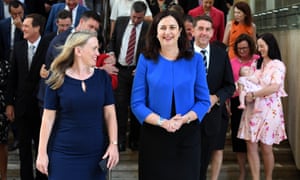The Queensland premier, Annastacia Palaszczuk,
will move to officially veto any loan to the Indian mining company
Adani from the Northern Australia Infrastructure Facility, as soon as
she and her new government are sworn into office.
After almost two weeks of vote-counting, Labor was declared the winner of the 25 November poll on Friday, returning to parliament with a majority for the first time under Palaszczuk’s leadership.
A letter confirming the Adani veto, which marked a turning point in Labor’s campaign, will be sent to the prime minister immediately after Queensland’s governor swears in the new state government on Tuesday.
“The premier will send the letter the Turnbull government actioning her 3 November announcement to use her government’s veto power to block the Northern Australia Infrastructure Facility loan for the Adani rail project,” a spokeswoman for Palaszczuk said. “Adani have previously said that the project’s mine and rail components had been given the ‘green light’ to proceed.”
The move to veto the Naif loan has frustrated the federal government, particularly the minister for resources and northern Australia, Matt Canavan, who last week told News Corp the Queensland government decision was motivated by “xenophobia” and “racisim”, comments Bill Shorten’s office labelled “unhinged”.
Palaszczuk announced the veto at the end of a fraught first week of campaigning, which included numerous ambushes from anti-Adani protesters, after learning of what she said was a planned “smear campaign”.
Palaszczuk said she had learnt political opponents planned to use her partner Shaun Drabsch’s work with PwC preparing Adani’s application for the Naif loan as proof of a conflict of interest, so she had decided to outright block the loan.
She further vowed to stop all direct taxpayer funds going to the mine and its associated infrastructure.
Labor remains officially supportive of the mine itself although, privately, members have expressed scepticism Adani will receive the funding necessary to make it a reality.
But the veto was seen as instrumental in saving south-east Queensland seats, particularly those in Brisbane, where preferences from the Greens proved crucial in deciding electorates.
That cost the LNP, with the biggest scalp coming in the form of the former Newman government minister Scott Emerson, who lost his seat to Queensland’s first Greens MP, Michael Berkman.
That has led to soul-searching within the Queensland opposition, which is about to undergo a leadership spill, following Tim Nicholls’s decision to step down as leader.
The LNP’s current deputy, Deb Frecklington, remains frontrunner for the position, although former leader John-Paul Langbroek has also thrown his hat into the ring, with a LNP backbencher, Mark Robinson, making it a three-point contest.
Frecklington has Nicholl’s endorsement and her choice of deputy, Tim Mander, brings many of the party’s Christian right votes, which is seen as giving her the edge. The LNP is expected to vote on its new leadership team on Tuesday.
After almost two weeks of vote-counting, Labor was declared the winner of the 25 November poll on Friday, returning to parliament with a majority for the first time under Palaszczuk’s leadership.
A letter confirming the Adani veto, which marked a turning point in Labor’s campaign, will be sent to the prime minister immediately after Queensland’s governor swears in the new state government on Tuesday.
“The premier will send the letter the Turnbull government actioning her 3 November announcement to use her government’s veto power to block the Northern Australia Infrastructure Facility loan for the Adani rail project,” a spokeswoman for Palaszczuk said. “Adani have previously said that the project’s mine and rail components had been given the ‘green light’ to proceed.”
The move to veto the Naif loan has frustrated the federal government, particularly the minister for resources and northern Australia, Matt Canavan, who last week told News Corp the Queensland government decision was motivated by “xenophobia” and “racisim”, comments Bill Shorten’s office labelled “unhinged”.
Palaszczuk announced the veto at the end of a fraught first week of campaigning, which included numerous ambushes from anti-Adani protesters, after learning of what she said was a planned “smear campaign”.
Palaszczuk said she had learnt political opponents planned to use her partner Shaun Drabsch’s work with PwC preparing Adani’s application for the Naif loan as proof of a conflict of interest, so she had decided to outright block the loan.
She further vowed to stop all direct taxpayer funds going to the mine and its associated infrastructure.
Labor remains officially supportive of the mine itself although, privately, members have expressed scepticism Adani will receive the funding necessary to make it a reality.
But the veto was seen as instrumental in saving south-east Queensland seats, particularly those in Brisbane, where preferences from the Greens proved crucial in deciding electorates.
That cost the LNP, with the biggest scalp coming in the form of the former Newman government minister Scott Emerson, who lost his seat to Queensland’s first Greens MP, Michael Berkman.
That has led to soul-searching within the Queensland opposition, which is about to undergo a leadership spill, following Tim Nicholls’s decision to step down as leader.
The LNP’s current deputy, Deb Frecklington, remains frontrunner for the position, although former leader John-Paul Langbroek has also thrown his hat into the ring, with a LNP backbencher, Mark Robinson, making it a three-point contest.
Frecklington has Nicholl’s endorsement and her choice of deputy, Tim Mander, brings many of the party’s Christian right votes, which is seen as giving her the edge. The LNP is expected to vote on its new leadership team on Tuesday.

No comments:
Post a Comment